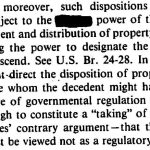Substance: Walters sued OpenAI, LLC for libel in Georgia state court. Procedure: OpenAI removed to federal court, but eventually got bounced back to state court, because it wouldn’t disclose all of its indirect members for diversity purposes. The rule in federal diversity cases is that an LLC (a Limited Liability Company), unlike a corporation, inherits the citizenship of each of its members, each of its members’ members (if some of the members of the LLC are themselves LLCs), and so on, turtles all the way down. Because OpenAI wouldn’t disclose all the indirect members, it couldn’t show diversity of citizenship between it and Walters (a Georgia citizen). Procedure about procedure: Walters then moved for costs and fees for litigating the removal motion; “the district court denied the motion … without explanation.” Procedure about procedure about procedure: Walters then appealed, and the Eleventh Circuit just remanded on the grounds that “[w]ithout any explanation for its denial of a request for fees [and costs], it is impossible for us to discern the correctness of the district court’s judgment. It is necessary, therefore, to remand the case to the district court for an explanation.” (The opinion is by Judges Wilson, Jordan, and Luck.)
As to the substance, recall that the Georgia trial court denied OpenAI’s motion to dismiss.
The post Minor Third-Order-Procedure Decision in <i>Walters v. OpenAI</i> Large Libel Models Lawsuit appeared first on Reason.com.






